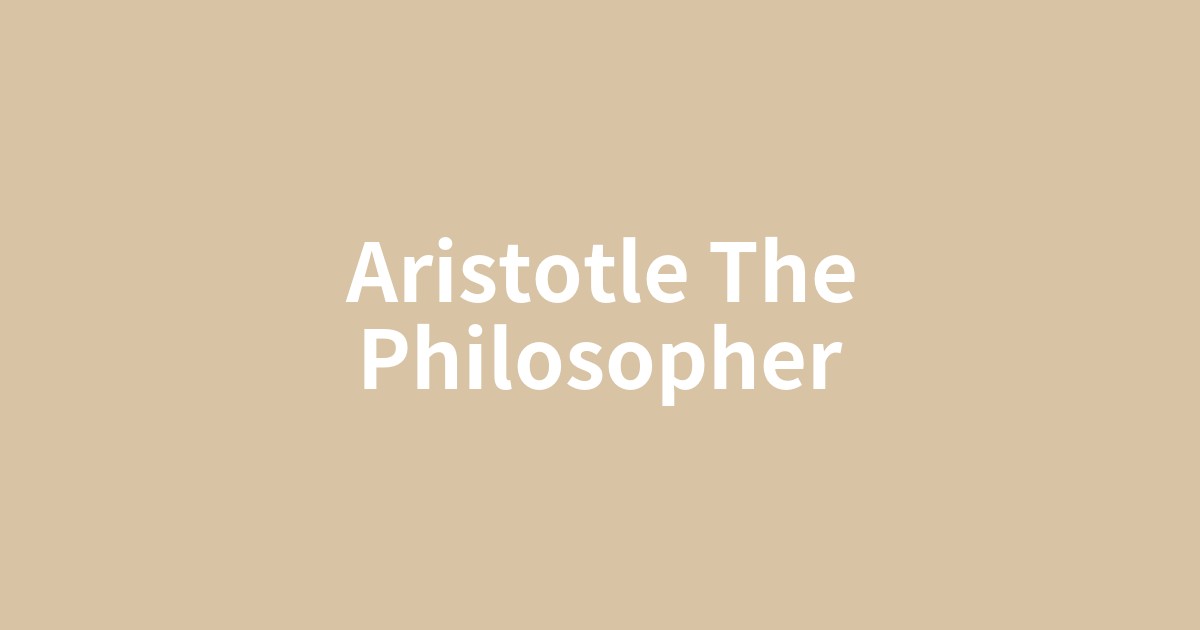このページは、歴史や文化の物語を楽しみながら、その文脈の中で重要な英単語を自然に学ぶための学習コンテンツです。各セクションの下にあるボタンで、いつでも日本語と英語を切り替えることができます。背景知識を日本語で学んだ後、英語の本文を読むことで、より深い理解と語彙力の向上を目指します。

師プラトンのイデア論を批判し、現実世界の観察と分類を重んじたアリストテレス。彼の論理学や自然学が、後世の学問のfoundation(基礎)をどう築いたか。
この記事で抑えるべきポイント
- ✓師であるプラトンがイデアという理想世界に真理を求めたのに対し、アリストテレスは我々が生きる現実世界の「観察」を重視したという、思想上の根本的な違い。
- ✓生物学、論理学、倫理学、政治学など、あらゆる学問分野の基礎を体系的に築いたことから「万学の祖」と称されていること。
- ✓彼の知性の核心が、物事を丹念に観察し、その本質に基づいて「分類(categorize)」するという、科学的な思考法にあったとされる点。
- ✓三段論法に代表される「論理学(logic)」や、「中庸」を重んじる倫理学など、彼が確立した概念が、後世の西洋思想の「基礎(foundation)」となったこと。
- ✓若き日のアレクサンドロス大王の家庭教師を務めたという意外な経歴と、その経験が彼の政治思想に与えた影響の可能性。
万学の祖アリストテレス ― 現実世界を「分類」する知性
「哲学(philosophy)」と聞くと、どこか雲の上の議論を想像しないだろうか。しかし、古代ギリシャに、徹底して地上に目を向け、現実を観察し続けた哲学者がいた。師プラトンと袂を分かち、「万学の祖」とまで呼ばれるアリストテレスは、なぜ、そしてどのようにして世界のあらゆる事象を解き明かそうとしたのか。彼の知性の核心に迫る旅を始めよう。
Aristotle, the Father of All Learning: The Intellect that Categorized the Real World
When you hear the word "philosophy," do you imagine a debate in the clouds? However, in ancient Greece, there was a philosopher who steadfastly turned his gaze to the ground, continuously observing reality. Aristotle, who parted ways with his teacher Plato to become known as the "father of all learning," why and how did he attempt to unravel all the phenomena of the world? Let's begin a journey to the core of his intellect.
師プラトンとの決別 ― 真理は天上か、地上か
アリストテレスの師であるプラトンは、我々が認識する世界は不完全な「影」であり、その向こう側に完璧で永遠の「イデア」という理想世界が存在すると説いた。真理は、その天上にあるイデアの世界にこそあると考えたのだ。しかし、アリストテレスはこの考えに満足できなかった。彼にとって探求すべきは、思弁的なイデアの世界ではなく、我々が五感で捉えられるこの「現実(reality)」そのものであった。彼は、具体的な個々の事物を丹念に「観察(observation)」することから始め、そこにこそ真理への手がかりが隠されていると信じたのだ。この思想的転換は、哲学の視線を天上から地上へと引き戻す、画期的な出来事だった。
A Break from His Master Plato: Is Truth in the Heavens or on Earth?
Aristotle's teacher, Plato, taught that the world we perceive is an imperfect "shadow," and beyond it lies a perfect, eternal ideal world of "Forms" or "Ideas." He believed that truth resided in this celestial world of Ideas. However, Aristotle was not satisfied with this notion. For him, the subject of inquiry was not the speculative world of Ideas, but the very "reality" we can grasp with our five senses. He began with the meticulous "observation" of specific, individual things, believing that clues to the truth were hidden there. This intellectual shift was a groundbreaking event that brought the focus of philosophy from the heavens back down to earth.
「分類」する知性 ― 論理学と自然学の誕生
アリストテレスの知性の核心は、物事をその本質に基づいて「分類する(categorize)」という科学的な思考法にあった。彼は、膨大な動植物をその特徴に応じて体系的に整理し、今日の生物学の原型を築いた。このアプローチは自然学に留まらない。彼は、正しい思考の道筋そのものを体系化し、「論理学(logic)」という学問を確立した。特に有名なのが、二つの前提から一つの結論を導き出す「三段論法」である。これにより、思考は形式化され、誰もが客観的に推論の妥当性を検証できるようになった。また、彼は全てのものが特定の姿になる「可能性(potential)」を秘めていると考え、この概念は事物の変化や成長を理解する上で重要な鍵となった。
The Categorizing Intellect: The Birth of Logic and Natural Science
The core of Aristotle's intellect lay in his scientific method of thinking, which was to "categorize" things based on their essence. He systematically organized a vast number of plants and animals according to their characteristics, laying the groundwork for modern biology. This approach was not limited to natural science. He also systematized the very process of correct thinking, establishing the discipline of "logic." Particularly famous is his "syllogism," which deduces a single conclusion from two premises. This formalized thought, allowing anyone to objectively verify the validity of reasoning. He also believed that everything holds the "potential" to become something specific, a concept that became a crucial key to understanding change and growth in things.
幸福(エウダイモニア)とは何か? ― 中庸の徳と目的論
アリストテレスの探求は、倫理学の領域にも及んだ。彼は、全ての自然物や人間の行為には究極的な「目的(テロス)」があると考える「目的論」を提唱した。そして、人間にとっての最高の目的は「幸福(エウダイモニア)」であると結論づけた。では、どうすれば幸福になれるのか。彼が示したのは、実践的な知恵としての「徳(virtue)」を身につけることだった。彼が説く徳とは、二つの極端な感情や行動を避け、その中間を選ぶ「中庸(メソテース)」に見出される。例えば、無謀と臆病の中間に「勇気」が、浪費と吝嗇の中間に「寛容」が存在するといった具合だ。理性によってこの中庸を見出し、実践し続けることこそが、人間を幸福へと導くと考えたのである。
What is Happiness (Eudaimonia)? The Virtue of the Mean and Teleology
Aristotle's inquiry extended into the realm of ethics. He proposed "teleology," the idea that all natural things and human actions have an ultimate "purpose" (telos). He concluded that the highest purpose for humans is "happiness" (eudaimonia). So, how can one achieve happiness? He pointed to the acquisition of "virtue" (arête) as a form of practical wisdom. The virtue he described is found in the "golden mean" (mesotes), which involves choosing the middle ground between two extreme emotions or actions. For example, "courage" lies between recklessness and cowardice, and "generosity" between wastefulness and stinginess. He believed that finding this mean through reason and consistently practicing it is what leads humans to happiness.
アレクサンドロス大王の家庭教師という横顔
アリストテレスには、マケドニアの王子、後のアレクサンドロス大王の家庭教師を務めたという意外な経歴がある。この経験は、彼の政治学の思想に大きな影響を与えた可能性がある。彼は多くのポリス(都市国家)の憲法を収集・分析し、理想的な国家体制を考察した。一人の若き指導者の教育に携わった経験は、彼の理論に実践的な深みを与えたことだろう。アリストテレスが残した知的な「遺産(legacy)」は、単に書物としてだけでなく、一人の偉大な統治者を通じて、現実世界に広範な影響を及ぼしたのかもしれない。
A Different Side: Tutor to Alexander the Great
Aristotle had a surprising role in his life as the tutor to the prince of Macedon, the future Alexander the Great. This experience likely had a significant impact on his political philosophy. He collected and analyzed the constitutions of many city-states (poleis) to contemplate the ideal form of government. The experience of educating a young leader must have given his theories a practical depth. The intellectual "legacy" Aristotle left behind may have spread its influence on the real world not just through his writings, but also through one great ruler.
結論
アリストテレスの功績は、個々の学問分野における発見に留まらない。彼の現実主義的な探求心と、物事を体系的に分類・分析する手法は、西洋における学問全体の「基礎(foundation)」を築いた。彼の思想は2000年以上の時を超え、今なお我々の思考の根底に息づいている。複雑化する現代社会を理解し、より良く生きるためのヒントは、この古代ギリシャの巨人の言葉の中に、今も見出すことができるのだ。
Conclusion
Aristotle's achievements go beyond his discoveries in individual academic fields. His realistic spirit of inquiry and his method of systematically classifying and analyzing things built the entire "foundation" of Western scholarship. His ideas have survived for over 2,000 years and still live at the core of our thinking today. Hints for understanding our complex modern society and living a better life can still be found in the words of this giant of ancient Greece.
テーマを理解する重要単語
logic
アリストテレスが確立した学問分野であり、彼の「分類する知性」が思考そのものに向けられた成果です。三段論法に代表されるように、思考を形式化し客観的な検証を可能にした彼の功績を理解する上で、この単語は中心的な役割を果たします。
文脈での用例:
There is a certain logic to his argument, even if you don't agree with it.
たとえ同意できなくても、彼の議論には一定の論理があります。
purpose
アリストテレスの倫理学と自然学を貫く「目的論(テロス)」という思想の根幹です。人間の行為を含む全ての自然物には究極的な目的があるという彼の考え方を理解する上で必須の単語。人間の最高の目的が「幸福」であるという結論に繋がります。
文脈での用例:
The main purpose of the meeting is to discuss the new project.
会議の主な目的は、新しいプロジェクトについて議論することです。
foundation
記事の結論部分で、アリストテレスの功績を位置づけるために使われています。彼の現実主義的な探求心と分類・分析の手法が、西洋の学問全体の「基礎」を築いたという、彼の歴史的重要性を象徴する言葉であり、この記事の締めくくりを理解する鍵です。
文脈での用例:
Trust is the foundation of any strong relationship.
信頼はあらゆる強い関係の基礎です。
virtue
アリストテレス倫理学の中心概念「徳(アレテー)」を指します。彼が説く幸福(エウダイモニア)に至るための鍵であり、「中庸」の実践によって得られるとされます。この記事の倫理学に関する部分を深く理解するために不可欠なキーワードです。
文脈での用例:
For the Romans, courage in the face of death was a great virtue.
ローマ人にとって、死に直面した際の勇気は偉大な美徳でした。
potential
アリストテレス哲学における重要な概念「可能性(デュナミス)」を指します。全てのものが特定の姿になる力を秘めているという考え方は、事物の変化や成長を理解する鍵でした。彼の自然学や形而上学の深みを読み解くために知っておきたい単語です。
文脈での用例:
Every child has the potential to become a great artist.
すべての子供は偉大な芸術家になる可能性を秘めている。
mean
この記事では、アリストテレス倫理学の核心「中庸(メソテース)」を指す名詞として登場します。しかし動詞「意味する」や形容詞「意地悪な」等、多様な意味を持つ単語です。文脈による意味の違いを学ぶことで、読解の精度が格段に上がります。
文脈での用例:
We need to find a happy mean between work and leisure.
私たちは仕事と余暇の間の良いバランスを見つける必要がある。
philosophy
記事全体のテーマであり、アリストテレスの知的探求の舞台そのものです。彼が師プラトンと袂を分かち、思弁的なものから現実観察に基づくものへと哲学のあり方を転換させた、という本記事の核心的な物語を理解するための出発点となる単語です。
文脈での用例:
He studied Greek philosophy and its influence on Western thought.
彼はギリシャ哲学と、それが西洋思想に与えた影響を研究した。
legacy
アリストテレスが後世に与えた広範な影響を総括する言葉です。単なる学問的業績だけでなく、教え子アレクサンドロス大王を通じて現実世界に及んだ影響まで含めた、彼の知的「遺産」の壮大さを理解するための重要なキーワードとなります。
文脈での用例:
The artist left behind a legacy of incredible paintings.
その芸術家は素晴らしい絵画という遺産を残しました。
observation
アリストテレスが現実を探求するために用いた、具体的な方法論を指す言葉です。思弁ではなく、個々の事物を丹念に「観察」することから始める彼の姿勢は、後の科学的思考の基礎となりました。彼の知性の特徴を最もよく表す単語の一つと言えるでしょう。
文脈での用例:
The scientist's theory was based on careful observation of animal behavior.
その科学者の理論は、動物の行動の注意深い観察に基づいていた。
reality
プラトンの理想世界「イデア」と対比される、アリストテレスの探求対象を指します。彼が「五感で捉えられるこの現実」にこそ真理の手がかりがあると考えたことは、哲学の視点を天上から地上へ引き戻す画期的な転換でした。この記事の対立構造を理解する鍵です。
文脈での用例:
The movie blurs the line between fantasy and reality.
その映画は空想と現実の境界線を曖昧にしています。
categorize
アリストテレスの知性の核心をなす「分類」という思考法を示す最重要単語です。彼が膨大な動植物を体系化し、生物学や論理学の基礎を築いた方法論そのものを表しており、この記事の主題「分類する知性」を理解する上で欠かせません。
文脈での用例:
The books in the library are categorized by subject.
図書館の本は主題によって分類されています。